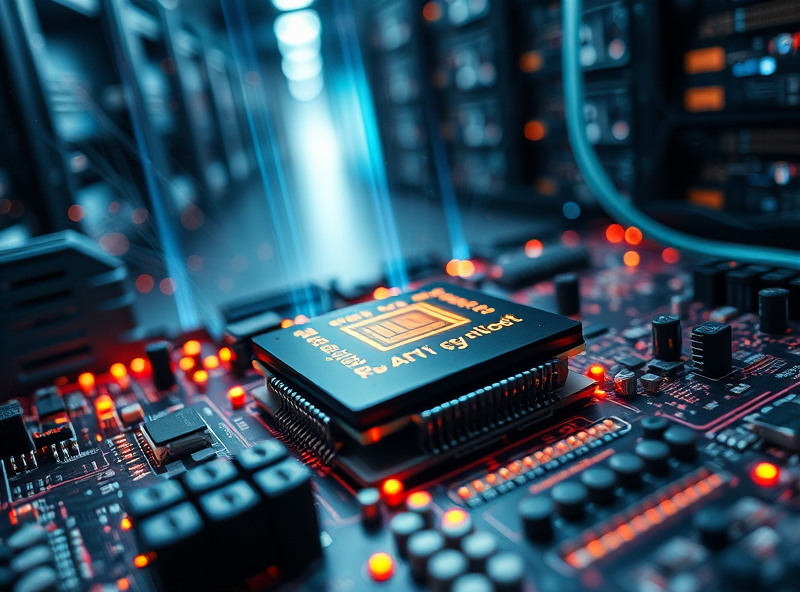
Broadcom’s Expansion: AI Chips Meet Infrastructure Software
Semiconductors Powering the AI Revolution

As artificial intelligence continues to reshape industries, semiconductors have emerged as the silent powerhouse behind this transformation. These tiny chips are the essential building blocks that enable AI algorithms to process massive datasets, make real-time decisions, and deliver intelligent outcomes. Broadcom, a global leader in semiconductor solutions, is strategically expanding its portfolio by integrating AI-optimized chips with infrastructure software. This move not only enhances performance but also ensures scalability and security across data centers and enterprise networks.
Semiconductors designed for AI workloads—such as GPUs, TPUs, and custom ASICs—are engineered to handle parallel processing and deep learning tasks with remarkable efficiency. They are the reason why AI models like ChatGPT, autonomous vehicles, and predictive analytics tools can function effectively. Broadcom’s recent investments in high-performance networking chips and AI acceleration technologies position the company at the forefront of the AI revolution.
Moreover, Broadcom’s focus on combining its semiconductor innovations with infrastructure software (e.g., VMware and Symantec acquisitions) creates a synergistic ecosystem. This integration allows businesses to deploy AI solutions faster, manage workloads efficiently, and maintain robust cybersecurity. As AI adoption grows, the demand for powerful, energy-efficient, and secure semiconductor infrastructure will only intensify.
Understanding the role of semiconductors in AI helps businesses and individuals make informed decisions about technology investments, cloud infrastructure, and digital transformation strategies.
For more insights on Broadcom’s AI strategy, visit: https://www.broadcom.com/company/newsroom
Enterprise Software Strength Through Strategic Acquisitions

Broadcom’s expansion strategy is a textbook example of how strategic acquisitions can transform a company’s capabilities and market position. While traditionally known for its dominance in semiconductor technology, Broadcom has been steadily growing its enterprise software portfolio through high-profile acquisitions. One of the most notable was its $18.9 billion acquisition of CA Technologies in 2018, followed by the $10.7 billion purchase of Symantec’s enterprise security business in 2019. Most recently, Broadcom completed its $61 billion acquisition of VMware in 2023, a move that significantly enhances its cloud infrastructure and virtualization offerings.
These acquisitions are not just about diversification—they are about synergy. By integrating enterprise software into its core business, Broadcom is creating a vertically integrated tech ecosystem that combines hardware performance with software intelligence. This approach is particularly relevant in the AI era, where software-defined infrastructure is essential for managing the massive computational demands of AI workloads.
For businesses, this means access to more robust, secure, and scalable IT solutions. Broadcom’s strategy also reflects a broader industry trend where hardware companies are increasingly investing in software to offer end-to-end solutions. This benefits enterprises by simplifying vendor relationships, improving interoperability, and reducing total cost of ownership.
As AI and cloud computing continue to evolve, Broadcom’s software acquisitions position it as a critical enabler of digital transformation across industries.
Source: https://www.broadcom.com/company/newsroom/press-releases
Synergy Between Hardware and Software Innovation

Broadcom’s strategic expansion into AI chips and infrastructure software marks a pivotal moment in the tech industry. At the heart of this evolution lies a powerful synergy between hardware and software innovation—two pillars that, when aligned, can exponentially enhance performance, scalability, and user experience.
AI workloads demand unprecedented processing power, and Broadcom’s advanced semiconductor technologies are engineered to meet these needs. Their custom AI chips are optimized for low latency and high throughput, enabling faster model training and inference. However, hardware alone isn’t enough. The real magic happens when this cutting-edge hardware is tightly integrated with intelligent software platforms.
By acquiring and developing infrastructure software—such as virtualization, security, and network optimization tools—Broadcom ensures that its hardware operates at peak efficiency in real-world environments. This integration reduces bottlenecks, improves energy efficiency, and simplifies deployment for enterprises.
For businesses and developers, this means shorter time-to-market, lower operational costs, and more reliable AI-driven services. For consumers, it translates into smarter applications, from voice assistants to personalized recommendations, that work seamlessly and securely.
Broadcom’s approach exemplifies how hardware-software co-design is no longer optional—it’s essential for innovation in the AI era.
For more on Broadcom’s strategy, you can refer to their official investor relations page: https://investors.broadcom.com/
Future-Proof Growth with AI and Hybrid Cloud Integration

Broadcom’s strategic expansion into AI chips and infrastructure software marks a pivotal shift in how enterprises prepare for the future of digital transformation. As artificial intelligence becomes increasingly embedded in business operations, companies are seeking robust, scalable, and secure solutions to manage data and workloads across hybrid environments. Broadcom is positioning itself at the intersection of these needs by integrating AI-optimized semiconductors with enterprise-grade software solutions.
The fusion of AI and hybrid cloud is more than a trend—it’s a necessity for businesses aiming to remain competitive and resilient. Hybrid cloud environments allow organizations to run workloads both on-premises and in the cloud, offering flexibility, cost-efficiency, and regulatory compliance. When AI capabilities are layered on top, businesses can automate decision-making, optimize resource allocation, and enhance customer experiences in real time.
Broadcom’s acquisition of VMware, a leader in cloud infrastructure and virtualization, further strengthens its hybrid cloud strategy. This move enables Broadcom to offer end-to-end solutions that integrate AI at the chip level with software that orchestrates complex, distributed systems. For IT leaders, this means reduced complexity, improved performance, and a more future-proof infrastructure.
For instance, industries like healthcare, finance, and manufacturing are already leveraging AI and hybrid cloud to drive innovation. From predictive maintenance in factories to real-time fraud detection in banking, the synergy between AI chips and cloud-native software is unlocking new levels of efficiency and intelligence.
In summary, Broadcom’s approach is not just about building faster chips—it’s about enabling a smarter, more agile enterprise ecosystem. As AI and hybrid cloud continue to evolve, companies that adopt integrated solutions like Broadcom’s will be better equipped to scale, adapt, and thrive in the digital age.
Source: https://www.vmware.com/company/news/releases/2023/broadcom-completes-acquisition-of-vmware.html






